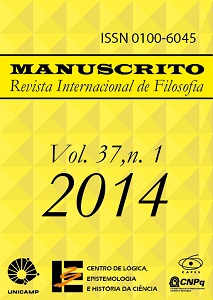Resumo
Atlas (2007) argues that semantic minimalism (as defended by Cappelen & Lepore 2005) fails because it cannot deal with semantic non-specificity. I argue that there is a plausible version of minimalism—viz., situated minimalism—which doesn’t succumb to the non-specificity charge insofar as non-specificity can be dealt with at a postsemantic level. Thus, pragmatics plays no role when it comes to determining the (minimal) proposition expressed. Instead, pragmatic and other extra-semantic considerations enter the scene in characterizing the situation vis-à-vis which the proposition is evaluated. For this reason a plausible form of minimalism must embrace a form of truth-relativism: a proposition is not universally true/false, but true/false only relative to a situation. I show how the position defended is not only (i) more cognitively plausible than either (semantic) minimalism as proposed by Cappelen & Lepore or the positions appealing to pragmatic intrusion into the proposition expressed, but is also (ii) in accordance with ordinary people’s intuitions.
Referências
ALMOG, J. & PERRY, J. & WETTSTEIN, H. Theme from Kaplan. Oxford University Press ,1989.
ATLAS, J.D. “Negation, Ambiguity, and Presupposition”. Linguistics & Philosophy 1: pp. 321-36, 1977.
ATLAS, J.D. “Meanings, Propositions, Context, and Semantical Underdeterminacy”. In G. Preyer & G. Peter (eds.). 2007. Context Sensitivity and Semantic Minimalism: New Essays on Semantics and Pragmatics. Oxford: Oxford University Press: pp. 217-39, 2007.
BACH, K. “Semantic Non-specificity and Mixed Quantifiers”. Linguistics & Philosophy 4: pp. 593-605, 1982.
BACH, K. “Conversational Implicitures”. Mind and Language 9: pp. 124-62, 1994.
BARGH, G. & CHARTRAND, T. “The Unbearable Automaticity of Being”. In D. L. Hamilton (ed.). Social Cognition: Key Readings in Social Psychology. New York: Psychology Press: pp. 228-48, 2005.
BARWISE, J. & PERRY, J. Situations and Attitudes. Cambridge: MIT Press ,1983.
BARWISE, J. & ETCHEMENDY, J. The Liar: An Essay on Truth and Circularity. Oxford: Oxford University Press, 1987.
BAUMEISTER, R. F. The Cultural Animal: Human Nature, Meaning, and Social Life. Oxford: Oxford University Press, 2005.
BEZUIDENHOUT, A. “Truth-Conditional Pragmatics”. Philosophical Perspectives 16: pp. 105-34, 2002.
CAPELLEN, H. & LEPORE, E. Insensitive Semantics. Oxford: Blackwell, 2005.
CARSTON, R. Thoughts and Utterances: The Pragmatics of Explicit Communication. Oxford: Blackwell, 2002.
CLARK, A. Microcognition: Philosophy, Cognitive Science and Parallel Distributed Processing. Cambridge: MIT Press, 1989.
CLARK, A. & CHALMERS, D. “The Extended Mind”. Analysis 58: pp. 10-23, 1998.
CORAZZA, E. “‘She’ and ‘He’: Politically Correct Pronouns”. Philosophical Studies 111 (2): pp. 173-96, 2002.
CORAZZA, E. “Description-Names”. Journal of Philosophical Logic 31 (4): pp. 313-25, 2002a.
CORAZZA, E. “Complex Demonstratives qua Singular Terms”. Erkenntnis 59 (2): pp. 263-283, 2003.
CORAZZA, E. Reflecting the Mind: Indexicality and Quasi-Indexicality. Oxford: Oxford University Press, 2004.
CORAZZA, E. “On Epithetsqua Attributive Anaphors”. Journal of Linguistic 41 (1): pp. 1-34, 2005.
CORAZZA, E. “Contextualism, Minimalism, and Situationalism”. Pragmatics and Cognition 15 (1): pp. 115-37, 2007.
CORAZZA, E. “Unenriched Sub sentential Illocutions”. Philosophy and Phenomenological Research 83 (3): pp. 560-82, 2011.
CORAZZA, E. “Same-Saying, Pluri-Propositionalism, and Implicatures”. Mind & Language27 (5): 546-69, 2012.
CORAZZA, E. & KORTA, K. “Minimalism, Contextualism, and Contentualism”. In P. Stalmaszczyk (ed.). Philosophy of Language and Linguistics (vol. 2): The Philosophical Turn. Frankfurt: Ontos-Verlag: pp. 9-39, 2010.
CORAZZA, E. & DOKIC, J. “Situated Minimalism versus Free Enrichment”. Synthese 184 (2): pp. 179-98, 2012.
DAVIS, W. A. “Dyadic Contextualism and Content Relativism”. Intercultural Pragmatics 10 (1): pp. 1-39, 2013.
DEVLIN, K. Logic and Information. Cambridge: Cambridge University Press, 1991.
KAPLAN, D. “Demonstratives”. In J. Almog, J. Perry & H. Wettstein (eds.) (1989). Themes from Kaplan. Oxford: Oxford University Press: pp. 481-563, 1977.
KORTA, K. & PERRY, J. “Three Demonstrations and a Funeral”. Mind & Language 21 (2): pp. 166-86, 2006.
KORTA, K. & PERRY, J Critical Pragmatics: How We Say (and Mean) Things with Words. New York: Cambridge University Press, 2011.
LEWIS, D. “Index, Content and Context”. In S. Kanger and S. Ohman (eds.) Philosophy and Grammar. Dordrecht: Reidel: (1980), pp. 79-100. Reprinted in LEWIS, D. Papers in Philosophical Logic. Cambridge: Cambridge University Press: (1998), pp. 21-44.
MACFARLANE, J. “Future Contingents and Relative Truth”. Philosophical Quarterly, 53: pp. 321–36, 2003.
MACFARLANE, J. “Making Sense of Relative Truth”. Proceedings of the Aristotelian Society 105: pp. 321–39, 2005.
MACFARLANE, J. “Semantic Minimalism and Nonindexical Contextualism”. In G. Prayer & G. Peter (eds.) Context-Sensitivity and Semantic Minimalism. Oxford: Oxford University Press: (2007), pp. 240-50.
PERRY, J. “Thoughts without Representation”. Proceeding of the Aristotelian Society 60: pp. 137-52. (1986). Reprinted in PERRY, J. The Problem of the Essential Indexical and Other Essays. Palo Alto CA: CSLI Publications: pp. 171-88. (2000).
PERRY, J. “Cognitive Significance and New Theories of Reference. Nous 22: pp. 1-18. (1988). Reprinted in PERRY, J. The Problem of the Essential Indexical and Other Essays. Palo Alto CA: CSLI Publications: pp. 189-206. (2000).
PERRY, J. Reference and Reflexivity: 2nd Edition. Palo Alto: CSLI Publications. (2001/2012).
PREDELLI, S. Contexts. Oxford: Oxford University Press. (2005).
PRAYER G. & PETER G. Context-Sensitivity and Semantic Minimalism. Oxford University Press, 2007.
RECANATI, F. Literal Meaning. Cambridge: Cambridge University Press, 2004.
ROBBINS P. & AYDEDE M. The Cambridge Handbook of Situated Cognition. Cambridge: Cambridge University Press, 2009.
SNYDER, M., TANKE, E. D. & BERCHEID, E. “Social Perception and Interpersonal Behavior: On the SelfFulfilling Nature of Social Stereotypes”. Journal of Personality and Social Psychology 35: pp. 656-66, 1977.
SPERBER, D. & WILSON, D. Relevance: Communication and Cognition. Oxford: Blackwell, 1986/95.
STANLEY, J. “Context and Logical Form”. Linguistics & Philosophy 23: pp. 391-434, 2000.
STOKANOVIC, I. “The Problem of De Se Assertions”. Erkenntnis 76 (1): pp. 49-58, 2011.
SUTTON, J. “Remembering”. In P. Robbins & M. Aydede (eds.). The Cambridge Handbook of Situated Cognition. Cambridge: Ca WILSON, R. & CLARK, A. “How to Situate Cognition”. In P. Robbins & M. Aydede (eds.). The Cambridge Handbook of Situated Cognition. Cambridge: Cambridge University Press: (2009), pp. 55-77.
WILSON, D. & SPERBER, D. “Truthfulness and Relevance”. Mind 111 (443): pp. 583-632, 2002. mbridge University Press: (2009), pp. 217-235.


